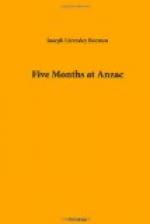It was amusing to hear the heated arguments between the Artillery and Infantry, in which the latter frequently and vehemently asseverated that they “could have taken the sanguinary place only our own Artillery fired on them.” They invariably supported these arguments by the production of pieces of shell which had “blanky near put their Australian adjective lights out.” Of course the denials of the Artillery under these accusations were very emphatic; but the production of the shell-fragments was awkward evidence, and it was hard to prove an alibi.
The advent of the hospital ship Maheno resulted in a pleasant addition to our dietary, as the officers sent ashore some butter, fresh bread and a case of apples. The butter was the first I had tasted for four and a half months. The Maheno belonged to the Union Company, and had been fitted up as a hospital ship under the command of Colonel Collins. He was the essence of hospitality, and a meal on board there was a dream.
While we were away along the beach for a swim one afternoon, the Turks began shelling our quarters. It had not happened previously, and everyone thought we were out of range. The firing lasted for about an hour and a half. I fully expected that the whole place would be smashed. On the contrary, beyond a few mules and three men hit, nothing had happened, and there was little in the ground to show the effects of the firing. (I noticed the same with regard to the firing of the naval guns. They appeared to lift tons of earth, but when one traversed the position later very little alteration could be detected.) The Turks, however started at night again, and one shot almost buried me in my dug-out.
The number of transports that came in and out of Anzac while we were there was marvellous, and a great tribute to the British Navy. There is no question as to who is Mistress of the Sea. Occasionally we heard of one being torpedoed, but considering the number constantly going to and fro those lost were hardly noticeable. The Southland was torpedoed while we were in Gallipoli, and Major Millard (who was on board) told me that there was not the slightest confusion, and only one life was lost.
TURKS AS FIGHTERS
One cannot conclude these reminiscences without paying a tribute to Abdul as a fighting man. All I know about him is in his favour. We have heard all about his atrocities and his perfidy and unspeakablenesses, but the men we met fought fairly and squarely; and as for atrocities it is always well to hear the other side of the question. At the beginning of the campaign it was commonly reported that the Turks mutilated our wounded. Now I believe that to be an unmitigated lie, probably given a start by men who had never set foot in the Peninsula—or who, if they did, had taken an early opportunity of departure. We were in a position to know whether any mutilation




